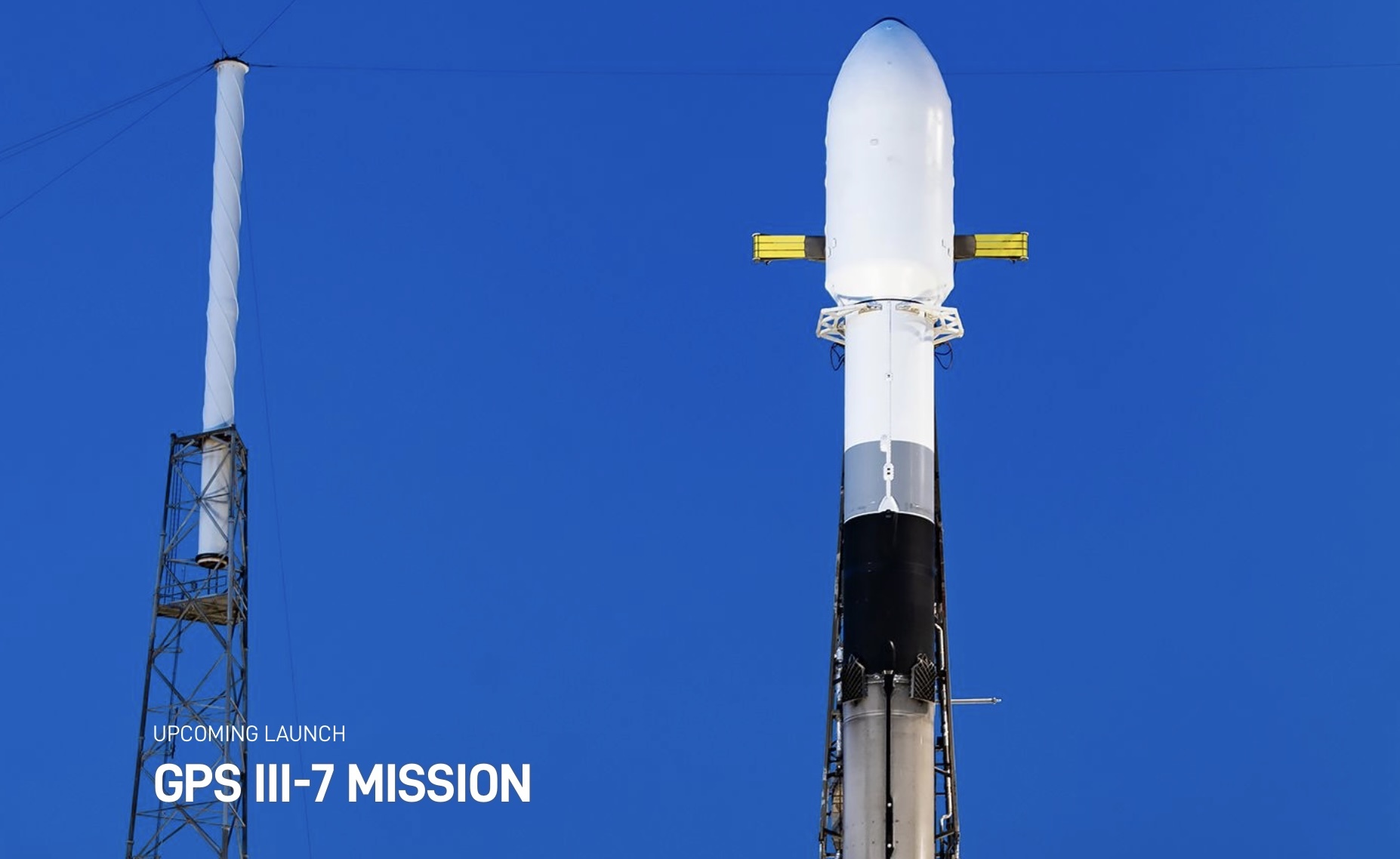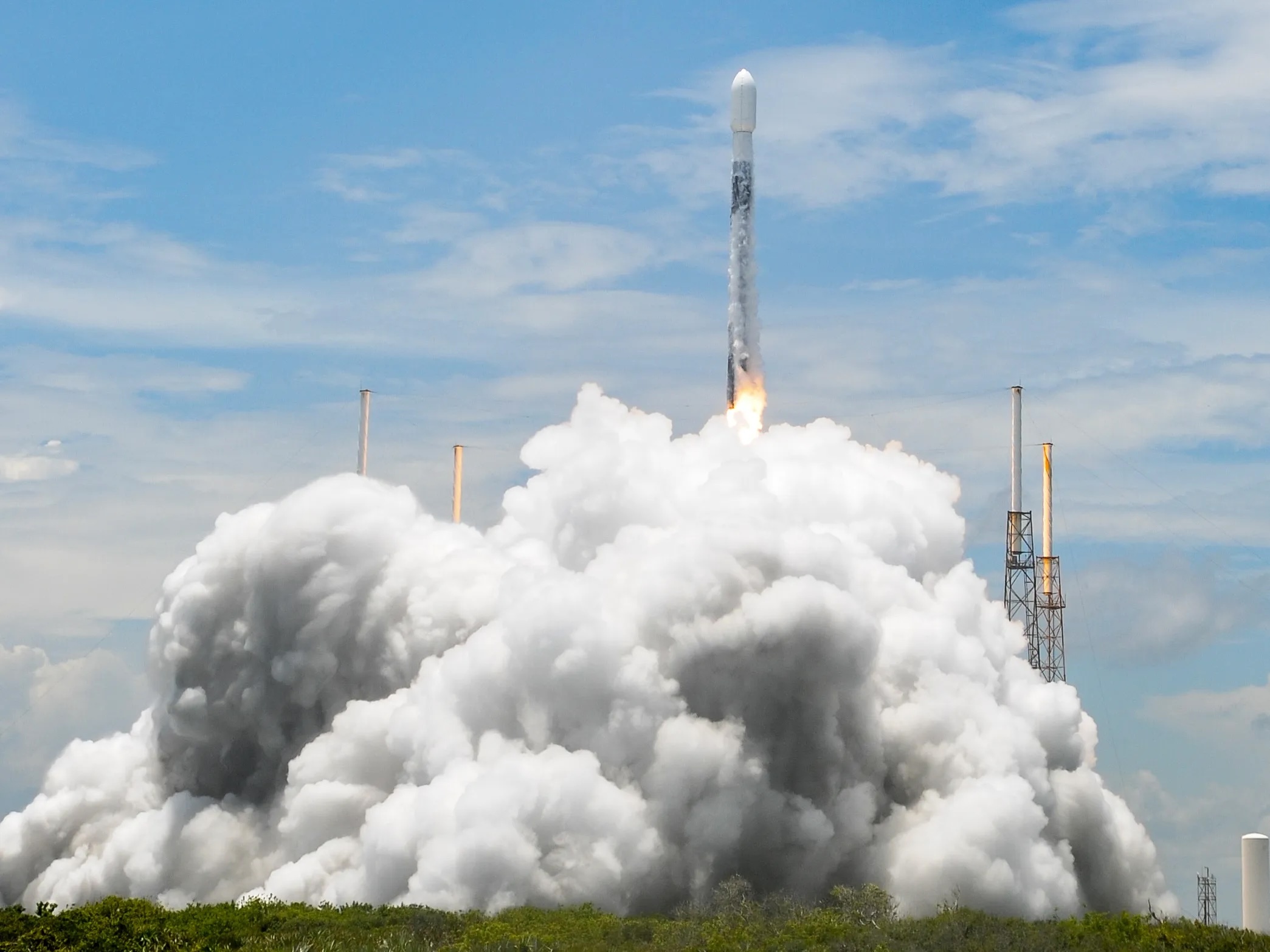30.05.2025
SpaceX to launch GPS III satellite for Space Force on Falcon 9 rocket from Cape Canaveral

Look for a SpaceX Falcon 9 rocket to propel a GPS III satellite into orbitfor the Space Force during an afternoon launch Friday, May 30, from Cape Canaveral Space Force Station.
The Falcon 9 will lift off with the Lockheed Martin-designed and -built satellite at 1:37 p.m. for this GPS III-7 mission, SpaceX announced. The launch window will expire one minute later.
"This second accelerated launch for GPS III is a continued demonstration of the United States Space Force's capability to rapidly reconstitute the constellation, should a need arise to do so," Space Force Col. Andrew Menschner said during a May 28 media roundtable.
"With 38 GPS satellites now on orbit, 31 of which operate on a daily basis, we have a healthy redundancy in the constellation," Menschner said.
"And that's great news for our joint military force and the 6 billion civilian users that rely on GPS for global flight operations, other means of travel, commerce, banking, farming and enhanced 911 capabilities that get help to people where they need it."
However, Mark Burger, launch weather officer with the Space Force's 45th Weather Squadron, said "weather will be a watch item" on launch day — sea breeze-fueled thunderstorms have swept across East-Central Florida throughout the week. He said there is a 45% chance of favorable weather for liftoff.
The National Weather Service predicts a 70% chance of precipitation May 30 at the Space Force installation, with showers likely and thunderstorms possible after 2 p.m. Partly sunny skies should otherwise prevail, with a high near 92 and southwest wind of 10 mph to 15 mph gusting to 20 mph.
In mid-December, SpaceX launched Lockheed Martin's seventh GPS III satellite from Cape Canaveral Space Force Station into orbit 12,550 miles above the Earth's surface. Touted as RRT-1 — or Rapid Response Trailblazer — this Space Force mission slashed the pre-launch planning and preparatory period from two years to less than five months as a national security demonstration.
Now, Space Force officials expect to complete that process within three months for the upcoming launch of Lockheed's eighth GPS III satellite.
“This launch executes a launch vehicle trade of the GPS III-7 mission from Vulcan to a Falcon 9 rocket, and swaps a later GPS IIIF-1 mission from Falcon Heavy to Vulcan, showcasing our ability to launch in three months, compared to the typical 24 months,” Space Force Col. Jim Horne said in a press release.
"It highlights another instance of the Space Force's ability to complete high priority launches on a rapid timescale, which demonstrates the capability to respond to emergent constellation needs as rapidly as Space Vehicle readiness allows," Horne said.
The recent wave of GPS III satellites is equipped with M-code technology — "a critical warfighter capability," per a Lockheed Martin press release.
"M-Code is an advanced, new signal designed to improve anti-jamming and anti-spoofing, as well as increase secure access to military GPS signals for U.S. and allied armed forces," the release said.
"GPS III space vehicles provide up to eight times more anti-jamming power than GPS II space vehicles, and M-code has been in operational acceptance since 2020.
"GPS satellites provide essential navigation for U.S. military assets, operational troops, and field supply deliveries while powering global financial markets, transportation, utilities, agriculture, construction and ride-share services."
Quelle: Florida Today
----
Update: 31.05.2025
.
SpaceX launches GPS satellite for Space Force after rains, storms sweep past Cape Canaveral

Dodging raindrops, a SpaceX Falcon 9 rocket bolted off the pad on a Space Force mission Friday, May 30, shortly after a wave of thunderstorms and showers soaked Cape Canaveral and surrounding areas.
The rocket deployed a GPS III satellite into medium-Earth orbit after the 1:37 p.m. liftoff from Launch Complex 40 at Cape Canaveral Space Force Station — where a special marine warning had advised boaters of steep waves, gusty winds and possible hail offshore.
During the SpaceX GPS III-7 launch webcast, Zachary Luppen, an avionics supply chain engineer, said the next-generation satellite will improve resistance to jamming and cyberattacks, boost military signal strength and add signals for civilian applications.
"Billions of devices and systems around the world rely on the U.S. Space Force-provided GPS signals. Not only is it critical to national security technologies, but everything from navigation on smart phones and in cars, boats and aircraft to disaster response, transportation systems, Federal Aviation Administration operations and even ATMs and banking transactions. All of these depend on GPS," Luppen told launch viewers.
"GPS III is the next generation of satellites required to maintain the resiliency of the GPS constellation and improve services to meet user demand," he said.
On May 28, Department of Defense officials announced Lockheed Martin received a $510 million Space Force contract modification to design and build two future GPS III satellites. Work will be performed in Littleton, Colorado, with a November 2031 projected completion date.
Prior to liftoff, odds of inclement weather remained a 50-50 coin flip past the point when SpaceX crews started fueling the Falcon 9 roughly 35 minutes before launch.
Thunderstorms had lit up National Weather Service radar screens in angry-looking red along the northern portion of the Cape about 1½ hours before launch, and widespread rain fell across Launch Complex 40.
Meteorologists issued a special marine warning for a north-south swath roughly ranging from Scottsmoor through Titusville to the Merritt Island National Wildlife Refuge. Winds topping 34 knots, steep waves and pea-sized hail were possible within this warning zone, which swept offshore by 1:15 p.m.
The Space Force mission marked the Falcon 9 first-stage booster’s fourth flight, SpaceX reported. The booster — which previously launched CRS-32, NROL-69 and one Starlink mission — landed on the SpaceX drone ship A Shortfall of Gravitas in the Atlantic Ocean after stage separation.
SpaceX's Falcon 9 launch clocked in as the 46th orbital rocket launch thus far this year from KSC and Cape Canaveral Space Force Station.
Next on the Eastern Range schedule, SpaceX will launch a Falcon 9 carrying Starlink broadband satellites during an early morning mission Monday, June 2, an FAA operations plan advisory indicates.
Launch window: 12:57 a.m. to 5:28 a.m. That rocket will also lift off from Cape Canaveral Space Force Station.
Quelle: Florida Today
